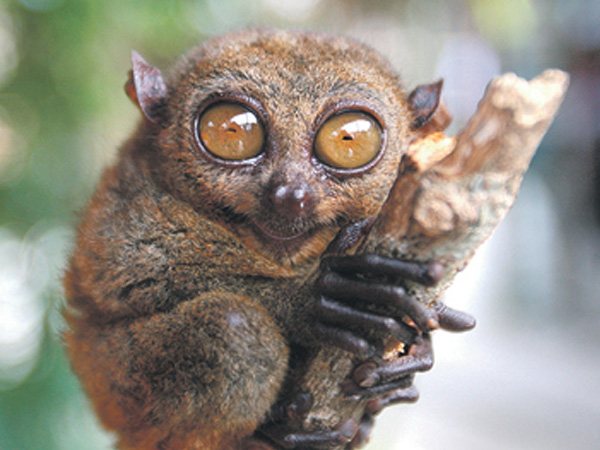
BOHOL TARSIERS A new study published on Wednesday says tarsiers communicate with one another using ultrasound frequencies inaudible to man and many species of predators. EDWIN BACASMAS
We wonder: What has happened to the poor tarsiers, owls and other endangered animals discovered at the airport stashed under plants in boxes labeled for export? After the discovery, no further development has been reported on the smuggling attempt, by a person, apparently a government employee, known to have done this nefarious deed before.
The smuggling attempt was cleverly planned. The 11 tarsiers, tiny creatures so delicate that they are known to simply keel over and die when stressed, were hidden in juice boxes covered with plants that were then put in styrofoam boxes. Three eagle owls, three scops owls, eight Philippine lizards, 11 monitor lizards and five rat snakes were given the same treatment. The boxes were officially sealed and certified by the Department of Agriculture’s Bureau of Plant Industry, and then identified as plant exports—specifically Amazon Sword and Elephant Ear Taro—destined for Japan. Clearly a multiagency operation.
The endangered and protected animals—a total of 47—were ultimately intended to be sold as “exotic pets” in Japan. The man behind this smuggling scheme has been identified as Gerald Bravo, an employee of the Office of Transportation Security (OTS) under the Department of Transportation and Communications. The scheme is made possible by the fact that, as a security screener for OTS, he has the access and the authority to pull it off.
According to Theresa Mundita Lim, director of the Biodiversity Management Division of the Department of Environment and Natural Resources, the DENR was tipped off early in January on what Bravo was planning to do. Together with the Bureau of Customs, National Bureau of Investigation and Aviation Security Group, the DENR conducted surveillance and was able to intercept the cargo before it left the Ninoy Aquino International Airport’s international cargo terminal.
Bravo, who has been with the OTS since 2007, was apprehended as well and has been charged with violation of the Wildlife Resources Conservation and Protection Act. A touch of irony: Only last September, he was lauded for his honesty when he returned a bag containing $5,500 to a Cebu-bound passenger at a security checkpoint in Terminal 4.
As we wait for developments on the case against this security man for his audacious smuggling attempt, it is important to note that Philippine wildlife has been smuggled out of the country with impunity.
In an interview two years ago, Lim noted the continuing high demand for rare animals though “they have little chance to survive in captivity.” She made the observation after the DENR found two juvenile hornbills, a hawk eagle, three juvenile raptors and an owl in two boxes on a Manila-bound bus from Camarines Norte.
In October 2014, businesswoman Olivia Lim Li was arrested in Zamboanga City after years of hiding. Li had been named as the owner of P35 million worth of marine species seized at the Eva Macapagal Port in 2011. In 2012, alleged wildlife trafficker Zhang Wen Wei was caught transporting rare Philippine reptiles to his native Hong Kong and was barred from ever entering the Philippines again. Last December, the DENR seized at least 100 endangered animals from a house in Olongapo City. The owner of the house, call center agent D’ar Corpuz, was said to be selling the animals online for P1 million.
Bravo’s smuggling attempt and subsequent arrest again train the spotlight on the prickly issue of crime and punishment. Olivia Lim Li was released after she posted a P4,000 bail bond. That tiny amount was all that was required under Philippine law, no matter the value of the prohibited cargo seized. “I guess it’s an area for law reform, but right now, there’s nothing we can do,” conceded Bureau of Fisheries and Aquatic Resources national director Asis Perez.
We would like to know what has happened in Bravo’s case, which once more underscores the gap between law enforcement and the general state of affairs in the country. It is not uncommon to find persons of authority flouting the law. Bravo appears to have taken advantage of his position at the Office of Transportation Security to smuggle rare animals to parties overseas who will pay huge sums for them. Thus are Philippine fauna endangered by the very people tasked to look out for them.

